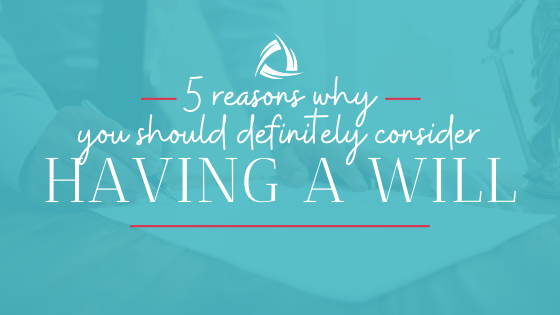A Last Will and Testament is a legal document that lets you decide what happens with your property and estate after you pass away. While being a helpful tool for creating clarity in the distribution process, wills are a great way to save those you love money and the emotional hardship that comes with not having a plan in place. Despite this, a recent survey from YouGov found that only 32 percent of United States residents had wills in place. If you are one of those 68 percent, here are five reasons why you should consider investing time in creating a will.
Help with the grieving process
When you do not have a will, the court has to name a personal representative to administer the estate. Not only can this process be time consuming, it can often cost thousands of dollars, and result in anger and frustration on the part of your loved ones who will have to give up all control over the future property received from you. The person who is eventually designated will also have to deal with several potential recipients pulling on them to favor them more than others, or justify why they deserve a certain allotment. This process can create anger at everyone, including the deceased, and make the entire distribution of assets a process that lasts potentially years longer than the streamlined probate process that occurs when a will is present.
Your will does more than assign your property
An important function of most wills is the distribution of a will maker’s property, however there are several aspects of wills that get much less attention. For example, a will can:
- Name an executor to handle all of the smaller details associated with your estate
- Forgive debts and donate to charities
- Create trusts for your children, as well as any other young beneficiaries you designate
- Name guardians for your children and any property you designate to them, or that they already have
Through creating a will, you are able to handle a wide range of complicated issues and important designations quickly and efficiently. Even if you use other estate planning tools, you will often still need to account for these factors separately.
Minimize probate
Almost all estates will have to go through a probate court to start the legal process overseeing the distribution of assets. One of the primary things you will want to avoid is in lieu of a clear plan, the local and state courts will have to decide the value of any property that does not have an easily accessed value. This includes such examples as collectibles, antiques, oil and mineral rights, patents, or subjective items. After years of accruing your valuables, you do not want the courts deciding the value of that property, nor do you want them deciding who gets each item and at what price.
Reduce the potential for family conflict
Experiencing the death of a loved one can be a traumatic and highly emotional experience. These times are often filled with grief, uncertainty about how people will carry on, and even sadness and anger. The smallest perceived slights – a voice tone, a look, or lack of presence – can result in hard feelings that people are willing to do battle over. As a result, it is often the absolute wrong time to ask your loved ones to try to interpret your desires and decide who “deserves” what.
To add to the property distribution complexity, many individuals today may have had families that ended in divorce and have remarried, or have a blended family where a straightforward distribution might not be reasonably assumed. Unless you designate your intentions for your property, there are many landmines that can blow up future relationships between those you love.
Protect your business
Creating a Last Will and Testament is a good way to pass your company, or your equity and ownership in a company, on to your heirs. Considering that almost 70 percent of family-owned businesses do not last past the first generation, it is often a good practice to establish who will possess what portion of your interests in a company, and designate the roles for everyone who will be involved. Businesses are living organisms, and any delay whatsoever in their ownership or operations can quickly spell disaster for the entity you put so much time and energy into building.
A will can be a powerful tool for ensuring that your loved ones are taken care of, and your business affairs can be settled without creating turmoil or discontinuity. For more insights into setting up the best possible will for your property, call Hartmann Law at (816) 599-6638 or contact us through our contact form.

